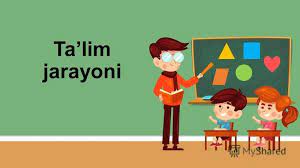SHARE WITH FRIENDS:
SUBJECT. THE ESSENCE OF THE EDUCATIONAL PROCESS, THE EDUCATIONAL PROCESS AS A SINGLE SYSTEM
I. PLAN:
1. Content - essence of the educational process.
2. Educational process as a single dynamic system.
3. Education as a unique form of knowledge.
4. Classifications of teaching and learning processes and their interrelationship in the educational process.
5. Educational ideas of Eastern and Western thinkers.
6. The relationship between the educational process and the psyche of learners.
7. Harmony of educational, educational and developmental tasks of teaching.
8. Laws and principles of education.
II. THE GOAL.
Scientifically-methodically justifying the general characteristics of the content-essence of the educational process and its unique dynamic system, and explaining the content-essence of the educational laws and principles based on them.
III. TASKS:
1. To substantiate the organizational-structural view of the educational process and the fact that the educational process based on it is a single dynamic system.
2. To describe the place and role of knowledge of existence and teaching processes in it.
3. Elucidation of historical didactic foundations in the field of education and their importance in modern education.
4. To justify the important aspects of taking into account the mentality of learners, the educational, educational and developmental tasks of teaching in the educational process.
5. Interdependence of educational laws and principles and ways to follow them in the educational process.
IV. KEY CONCEPTS:
Educational process; content - essence; dynamic system; know the stage; learning algorithm; intellectual age; sense and perception; imagination; thinking; knowledge, skills and abilities; teaching concept; teaching process; pedagogical education; learning objective; learning tasks; educational purpose; educational content; educational tools of education; methods of education; assessment in education; organizational-structural scheme; effectiveness of pedagogical processes; lesson; independent education; educational relations; events; pedagogical practice; pedagogical experience - test; Taoist School; educational laws; principles of education; science; the principle of demonstrability.
